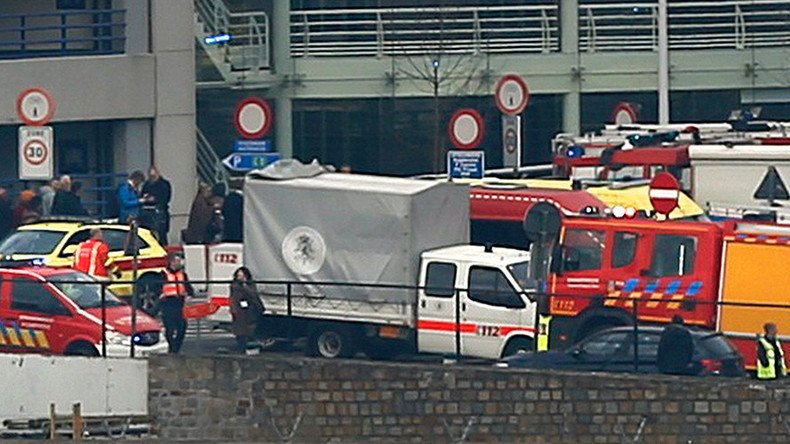Brussels attacks: ‘Root causes of terrorism are always political’

The Brussels blasts come shortly after the arrest in the Belgian capital of one of the key suspects behind the Paris attacks - is there a connection? Can tighter security measures help prevent similar attacks? How prepared is the EU for possible attacks?
The attacks on Brussels’ airport and a metro station have claimed the lives of over 20 and left scores injured.
READ MORE: 17 dead, dozens wounded in 2 blasts at Brussels airport - reports
Writer and political commentator John Wight says it’s “not a surprise to anyone watching this developing story.”
“It certainly comes on the back of the recent arrest of the Salah Abdeslam, the last of the Paris terror suspects. But even more worryingly it comes close on the heels of the recently released report by the French Interior ministry which claims that there are up to 90 potential suicide bombers roaming across the EU,” Wight told RT.
The core causes of terrorism are always political, believes RT host Afshin Rattansi.
“I suppose the first port of call is usually the media, isn’t it? We must remember that the reports of the latest explosions on the underground system reinforced the idea that there cannot really be protection from this kind of terror, if it is indeed terror that is meted out by insurgents. One should also remember that the airport is only four miles from NATO headquarters. However, I think that media is already reporting: from now on European air travel has to be the same as that in Israel; there will not only be the checks of bags as you go on the aircraft; there will be checks of bags as you go into the airport,” he said.
“Of course the fact is: no amount of security at passenger terminals is going to protect the people of Europe. These are political decisions. The root causes of terrorism are always political,” he added.
Former MI5 intelligence officer Annie Machon lives in the Belgium capital not far from the Maalbeek metro station. She said there was “pure chaos” in the streets after the attacks.
“This city has had an intensely high security presence since the Paris attacks last November,” she said. “Yet, you cannot stop the suicide bombers going in if they are minded to do that. I think our leaders are going to have very interesting conversations today – how on Earth can you counter this? Is it getting more security, or should there be a more fundamentally different approach to try to deal with this terrorist threat,” Machon added.
No security measures taken near European Parliament
Greek MEP Notis Marias was in his office in the European Parliament at a time of the metro station attack and says no security measures were taken in the area following the airport explosions earlier on Tuesday.
“I think this is a very big mistake on behalf of the security forces of Belgium, because when you have a terrorist attack in Brussels – especially at the international airport – it is very obvious that after that you should [take] measures in terms of security for certain areas – especially the European Parliament and the European Commission,” he told RT.
Answering RT’s question why it is so easy to travel through Europe, terrorism expert David Lowe said: “It has been a problem with the Schengen agreement within the EU, where obviously for freedom of movements of goods, services, and people you have the correlative effect on also freedom of movements of criminals and terrorists for the Schengen within the EU.”
He suggests this is one of the reasons why the UK did not sign up to this agreement; “we maintained our important border controls here.”
“Since the November 13 attacks in Paris there have been a number of questions raised about the freedom of movement throughout the EU and this inability to stop and target certain crossing points,” he told RT. “So it is an issue the EU is going to be looking at seriously. Once again we have these horrendous events in Brussels this morning, which is highlighting this point,” Lowe added.
‘Schengen is dead’
British Prime Minister David Cameron has criticized the UK Independence Party (UKIP) for seeking to use the Brussels blasts to argue for the UK to leave the EU.
UKIP MEP for Yorkshire and North Lincolnshire Mike Hookem told RT the party has long been calling for tighter security within the EU's visa-free travel zone.
Cameron says we're safer in the EU. Well I'm in the centre of the EU and it doesn't feel very safe.
— Mike Hookem MEP (@MikeHookemMEP) 22 March 2016
“Because of the Schengen agreement and free movement of people, these people have been allowed to get into the EU, they’ve been allowed to cross freely across Europe, with their weapons and explosives, and they’ve never been pulled up,” he said.
In his opinion, borders should be brought back.
“We have to stop these people, and that is the only way to do it,” Hookem said. “Schengen, I’m afraid, is dead.”
The statements, views and opinions expressed in this column are solely those of the author and do not necessarily represent those of RT.












